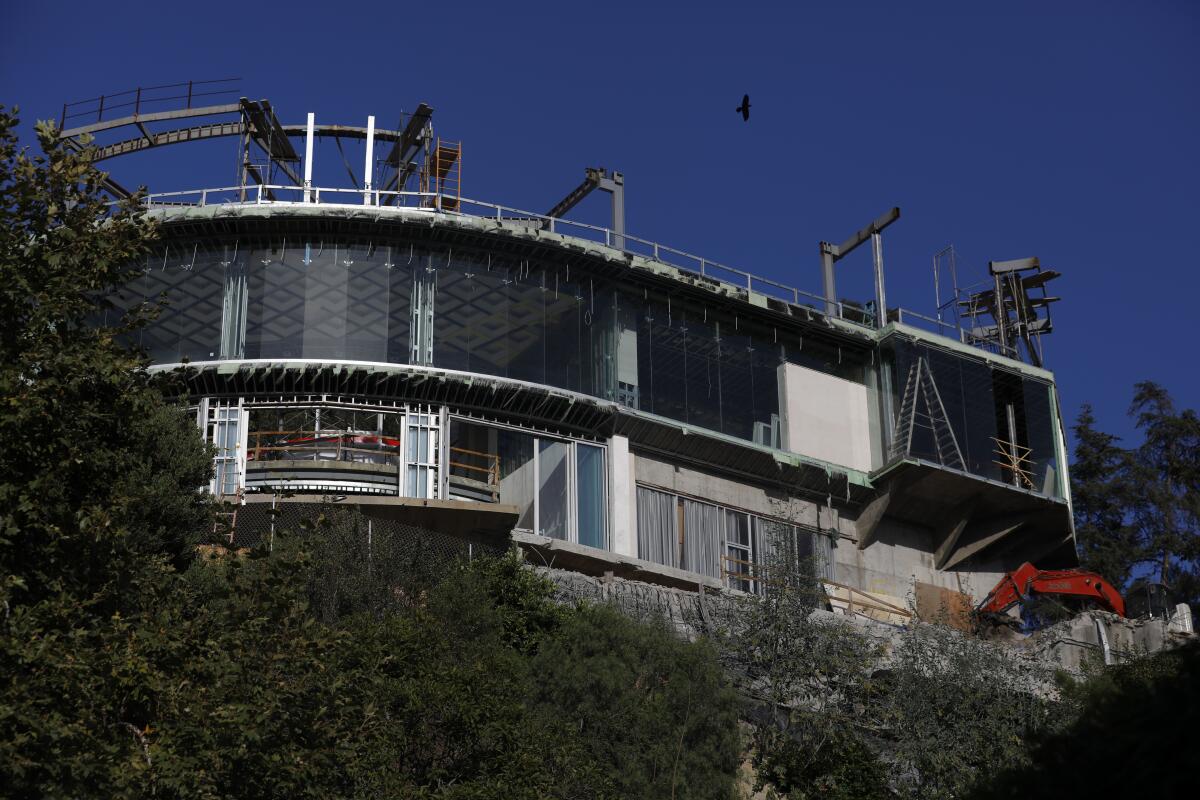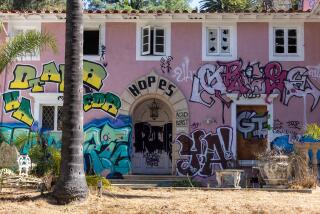Bel-Air mega-mansion that led to charges for Mohamed Hadid must be torn down

Real estate developer Mohamed Hadid once scoffed at the idea of tearing down the colossal mansion that had landed him in criminal court, telling Town and Country magazine that “Bel Air will fall before this will.”
Now a court has ordered that the mega-mansion must, in fact, come down, capping years of battles between Hadid and Bel-Air neighbors over the fate of the unfinished house.
Los Angeles County Superior Court Judge Craig D. Karlan declared weeks ago that the hulking structure was a “danger to the public” and ordered it to be torn down to the slab.
But that order was put on hold after the company that owns the site, 901 Strada LLC, abruptly declared bankruptcy. At a hearing Tuesday, a bankruptcy judge tossed out the filing, saying it had only been lodged to thwart the demolition.
At a hearing Friday, Karlan said his order was back in effect. That order asserted that an inadequate foundation and other problems had left the neighbors “at a legitimate risk of suffering damage and harm to their homes,” deemed demolition necessary to protect the community and appointed a receiver to oversee the tear-down.
Attorney Larry A. Rothstein, who represents Hadid, said in a statement this week that the findings by the judge suggested “a rush to judgment and without taking into account all of the facts,” including conclusions by engineers hired by them and the city that the building “presents no imminent danger to the neighbors.”
The rise of the mammoth, half-built mansion on Strada Vecchia Road led to criminal charges, government investigations and a courtroom battle with neighbors, who said they feared the huge building could slide down the hillside.
The long-standing dispute drew added attention in the media because Hadid is a famous figure, a builder of lavish homes who has appeared on reality TV and whose daughters Gigi and Bella grace magazine covers.
More than two years ago, Hadid pleaded no contest to criminal charges after prosecutors accused him of building a house far bigger than the city had allowed. Hadid was ordered to bring the home in line with city codes. Neighbors sued in civil court, demanding a tear-down and arguing that the city had failed to hold Hadid to account.
As the legal battle dragged on, city officials eventually chimed in with the demands for demolition, citing concerns with the piles — a type of column that extends into bedrock to support a structure — that buttressed the hefty house.
The findings echoed testimony by a former construction manager on the Bel-Air site, who said in a legal declaration that the piles should have been driven deeper and were short on the required rebar.
In his declaration, Russell Linch also claimed that a city inspector scrutinizing the site had gotten woodwork done on his home and that there was no evidence of payment. A Los Angeles city investigator likewise testified that a city inspector got “items of value” in connection with his work on the site and that the FBI was probing the issue.
Hadid has denied wrongdoing, saying he only pleaded no contest to the criminal charges to “move on” and avoid embarrassing city inspectors who had given their blessing to the construction. The real estate developer also said he would “never, ever, ever pay an inspector.” And he sued back, accusing one of the neighbors of trying to extort him.
None of what happened to the house would have happened, Hadid said in an email this week, if “I agreed to his extortion.”
In the past, neighbor Joseph Horacek had called that “a gross distortion” of his discussions with Hadid. In court papers, his attorneys instead characterized the talks between Horacek and Hadid as “settlement conversations initiated by Hadid” about how to compensate Horacek for the diminished value of his property.
It is unclear exactly how much the tear-down might cost. Attorneys for Hadid have pegged the cost at $5 million, while others have suggested it could be lower. At Friday’s hearing, an attorney representing the court-appointed receiver said they would assess the costs and come up with a demolition plan.
One of the attorneys representing Hadid argued that the city should have to pay for the tear-down, citing a specific provision in city codes about abating a “public nuisance.”
Karlan said he would instead sign an order for a kind of lien that could result in First Credit Bank or other lenders covering the costs for the receiver overseeing the demolition.
Karlan said that doesn’t mean that Hadid won’t end up paying, stressing that Hadid had signed a guarantee on the property. First Credit Bank, which loaned some of the money for the Bel-Air project, has not yet decided whether it will try to recover money from the developer, its attorney Michael Fazio said Friday.
Attorneys for the city are still locked in a battle with the Bel-Air neighbors over how and when the city took action on the mammoth building. In a legal filing, attorneys for the neighbors argued that after Hadid was sentenced, the city “fell down on the job” and “has refused to set and enforce any deadlines” for Hadid to rework or tear down the structure.
City attorneys countered that Los Angeles took escalating steps to address the illegal conditions at the site, which led to Hadid removing parts of the massive home and taking steps to control erosion. They have called for the court to exclude the city from the ongoing suit, arguing that it had wide discretion on how to handle the case against Hadid.
More to Read
Sign up for Essential California
The most important California stories and recommendations in your inbox every morning.
You may occasionally receive promotional content from the Los Angeles Times.











